#hypervisibility hyper invisibility
Explore tagged Tumblr posts
Note
Ive been thinking about that exit poll post of yours and the dangerous hypervisibility that the exit poll contributes to.
At the same time, I've been working on a disability presentation about voting while disabled that begins with discussing how there is no exit poll that includes the disability community, that contributes to hyperinvisibility.
I want to include the point made about the hypervisibility the jewish community gets, contrasted against the hyperinvisibility that the disabled community gets, but I worry
Could this do more harm than good?
I think it is a good idea and will not cause harm.
These two populations are good mirrors of each other in terms of opposing disproportionality.
There are approximately 70 million disabled adults in America. As many as 1 in 4 American adults are disabled according to the CDC.
The lowest number I could find for the number of disabled adults in America was 20 million. I will not link the website I saw 20 million, because I couldn’t verify its reliability. But let’s use it as a hypothetical lower boundary, knowing that the CDC estimates that number to be much higher. The lowest number of disabled adults I could find amounts to 11% of the US population. The highest I could find was 28.7% of the US population.
There are between 15 and 17 million TOTAL Jews in the entire world. Not adults. Not American Jews. All Jews. There are, at a bare minimum, 3 million more disabled adults in America alone than there are Jews in the ENTIRE WORLD.
As for American Jews? There are 7.5 million. Total. 5.8 million of us are adults. There is, at minimum, 14.2 MILLION more disabled adults in the United States than Jewish adults.
The population of disabled adults in the United States is more than double the population of Jewish adults in the United States. At the lowest possible number. There are fewer Jewish adults in the United States than the number of Jews who died in the Holocaust. There are only 1.7 million more Jews in the United States than were killed in the Holocaust.
The CDC estimates that disabled adults in America alone outnumber the total world Jewish population by as much as 53 million and the American Jewish population by 64.2 million. That makes the number of disabled adults in America more than 11 times the number of Jewish adults here and more than thrice the number of Jews in the world.
This is further evidence of both your point and mine. Why are Jews singled out as a politically significant demographic? We voted more strongly in favor of Harris than any other religious group and it did NOTHING to sway the results. If all disabled people voted with as much unity as we did they could control the entire country. (I know there are myriad reasons why disabled people may be unable to vote and this isn’t intended to shame any disabled person).
The point isn’t that Jewish voices don’t matter. Our voices absolutely matter. But shining the spotlight directly on us at a time of a 400% increase in reports of antisemitism is bizarre and dangerous. Especially when that antisemitism is currently festering in political motivations. I truly can’t think of a single valid reason that we would be singled out for polling purposes other than to provide people who hate us with a chance to blame us for political ills, further endangering us.
If we are going to poll Jews (and I believe we SHOULD poll Jews), we should also be polling the other religious groups that are similar to us in number. Otherwise it’s a kind of discriminatory hypervisibility that inexplicably endangers a minority group.
Meanwhile, you would THINK that even ONE party would care about a demographic that comprises as much as 25% of the electorate. It is bizarre and dangerous to ignore the needs and desires of 25% of the electorate. It may serve republicans who pretend that everyone is a cishet able-bodied white Aryan living in the 1950s and earns a living wage, but it doesn’t serve democrats who claim to care about equity, inclusion, and progress.
This is also discriminatory in the hyperinvisibility it thrusts upon disabled Americans. There is no logical reason to exclude such a large demographic from exit polls, other than to send a message that their voices do not matter and their needs as American citizens are not priorities.
I don’t know the exact nature of whatever it is you’re working on. But I think the contrast in the types of harm this causes to both groups is a worthwhile cultural cross-section to highlight. I think that as long as you don’t downplay the harm to the Jewish community in an attempt to explain the plight of disabled voters (and it doesn’t seem like you would do something like that), then it is very worthwhile to highlight these inexplicable and contradictory polling practices.
#antisemitism#political antisemitism#hypervisibility hyper invisibility#Jewish#disabled#ask me stuff#wreckitremy
25 notes
·
View notes
Text
thinks about how jews are hypervisible and yet hyper invisible. how we are always being spoken of and in the public mind and grouped with "abrahamic religions" yet how people know so little about our actual culture, religion, history. how people know about the holocaust but don't know why it happened. how people know the word "antisemitism" and say they don't support it but don't believe it's still a real problem. how people know jews exist but don't think about how antithetical to jewish life their christian societies are, how few jews there are. how people assume jews are just diet christians, just special white people, both to be made hypervisible as the supposed symbol of the wrongs of white christian hegemony and to be made hyper invisible victims of it.
940 notes
·
View notes
Text
I'm tired of trans "representation".
every time there is a show, trans rep = trans woman.
Never trans man or transmasc.
Even rarer non-binary, who are fem-presenting most of the time. media presents afab non binary people more than amab non binary people, because they think that being NB is just being "Woman lite" (it's a running joke in the transphobe community)
Always trans fem who are pretty
Never middle transition fem Like...HELLO, "UGLY" TRANS PEOPLE EXIST OKAY? AND WE HAVE VARIOUS WAYS OF DRESSING! Yet everyone makes us be always the generic ones!
But the FEMS are everywhere
Not their fault (I think) but they get much more rep and resources and luck to transition than transmasc
Estrogen easy to get (they think cis women want preg)
Testosterone takes a huge annoying work (cis males fault for using it irregularly)
"Getting mtf hrt legally is 10 times easier than getting ftm hrt in a legal way. Even when getting it in a legit way is still harder. It's like they're trying so hard to keep women" - my friend
To a point many transmasc look "too afeminated" to even get a rep
Always tagged as "masculine woman"
Both transmascs and transfems suffer, but one suffers with the suffering more seen than the other
And then we get invalidated by those annoying transfems who say "we suffer more than you" (Yes i saw that one post)
We both suffer the same things, bitch. But at least you're lucky media likes you more than me.
im not saying "fuck you all" to the transfems im just saying "hey we ALSO matter! Not just you, we are even more erased than you!" PLEASE SEE US! WE EXIST! TRANSMASCS ALSO SUFFER! NONBINARIES WHO ARE MORE IN THE AGENDER OR MASC AREA OF THE SPECTRUM ALSO SUFFER! (Addittions below for those who want to assume things)
i think some people missed the point completely. No, this post intent's wasn't to put transmascs and nonbinaries against trasfems. I absolutely believe we both have struggles. About the estrogen part, it's easier in a way because you can just pay for it and get it, like...not with a doc's recommendation. It's not a good thing to do but at least some do due really high dysphoria while for people wgo want testosterone, even if we try to buy it normally we can't because of stupid CIS men who used it irregularly to build muscled.
Imma repeat this once again: We all suffer.
Transfems suffer from hypervisibility
Transmascs suffer from hyper invisibility
Nonbinaries suffer forom much more hyper invisibility than transmascs, and when represented, most of the time they are creatures or AFAB/CAFAB without personality.
I get it, most representation media tries to make is shitty but at least there is some representation??? Better than nothing! And I'm not saying we shouldn't complain at shitty representation, but look into a general area of it.
Also another thing I completely forgot to point out, is how intersexual people, too, suffer from hyperinvisibility. Like much more than transmascs and nonbinaries, they're so erased i accidentally forgot to mention them. They're not necessarily in the trans community (?)(correct me if I'm wrong I am open to constructive criticism) but they also deserve to be mentioned here.
The queer community as a whole is a minority, and my point is: let's not make the less common groups be a excluded minority inside another minority. Diversity is important and representation too!
#nonbinary#transgender#trans community#transmasculine#trans male#trans masc#ftm#mtf#trans feminine#trans femme#trans women#trans erasure#over saturated#am i overreacting?#im not overreacting.#transmasc erasure#lgbtq community#lgbt#lgbtqia#lgbtq#lgbtqiia+#lgbtqiapn+#im tired#i need representation#please look at me#please#I exist look at me#i exist#and i need to be seen#Mjk_k.txt
60 notes
·
View notes
Text
i often feel like the male socialization claim against trans women is bullshit but also has some "passing privilege" discourse aspects to it to unpack. and yet the specific damage and suffering of someone forced to pass and hide is sometimes HARDER to put into words and eats her from the inside out more insidiously and with less support systems for it or even Words for it just having words for misogyny can help us cope with the oppression be heard and validated and fight it when when youre a cis woman and have always be sure and assured that you are. that's why so many trans women are facing material oppression like poverty and mental illness (like actual mental illness caused by lifelong pain and trauma not the transphobic idea). tho even then there are such insidious, invisible aspects of misogyny that all women even we as cis girls are still trying to identify unpack and uplift each other out of so it's still a concern that runs deep. for me a lack of girls in stem is still so insidious and i would even give priority to helping more cis girls into stem because that pipeline to arts and humanities (and domestication) vs stem is pushed on kids and adolescents more subtly than the more obvious blantant misogyny. they don't outright say "oh you look like a boy to me you should work on computers" it comes in the form of subtle praise for one academic or life skill and subtle discouragement for another academic or life skill from adults who assigned your gender. so we say ya ok cool :) they're so proud of me :) not even cis women have put good words to it yet or figured out a good fight for it so we aren't really better off than trans girls in this aspect as we are on like more well established fights like autonomy in reproductive health or the right to vote or work
the passing privilege discourse thing to me isvery similar to a white passing person of color or a person with an invisible illness or disability or a gay guy who has a traditionally masculine personality. like a fem gay guy who was considered obviously gay since birth have problems that people who can kinda hide it don't and their childhood homophobia experiences were so different. tho still homophobia. but the people who can hide it are also forced to hide it, even from themselves!!?!. trans girls in childhood aren't visible girls until they come out. being closeted isn't a privilege but we know that invisibility vs hyper visibility are different kinds of pain that don't really counteract each other. also to be clear it's the aspect of being a GIRL that is invisible. often a trans girl is very visibly marginalized for not conforming to whatever a boy ks supposed to be. tho feminine boys and girls still have different experiences under misogyny where someone seen as a feminine boy is the indirect target. and how horrific that must be to homophobically / patriachically marginalized for not being the right kind of boy and on top of that like IM NOT EVEN A BOY LEAVE ME ALONE. it must be hell. it's not supposed to be about how easy it was for trans girls for fucks sake that's so deluded or that trans girls had the same experiences as cis het boys. it is usually just helpful to look at like opportunities and protections afforded to you by not being a visible girl like Mulan being encouraged and taken more seriously as Ping stuff like that is actually very healing to go over in your mind and process.
for me it was the dichotomy of having a serious but invisible childhood neurological disorder or difference but never being diagnosed until late in life early adulthood because i had atypical symptoms and was good in school. and i can't tell you how important it is formatively to be good in school and be able to blend in well enough to not get called out of class for extra help and not get bullied. but also the lack of help and slow invisible descent into madness and detachment from myself and denial of my own emotions and stressors and detachment from my soul while 24/7 masking and confusion every time i felt differently from what was expected like averse and avoidant and anxious or overwhelmed over "abnormal" things, or struggled with something that should be easy for "someone like me", i would just self gaslight and self deny and self blame. culminating in complete and total nervous mental breakdown at like 21 and at least a decade of recovery. with all that of COURSE i am sometimes gripped by envy of people who were diagnosed as young children as intended and spent their whole life knowing the most simple neurodivergent stuff about themselves like sensory overload because without that label when experiencing sensory overload i'm telling you it just seems like random bipolar mood swings, no wonder they put me on lithium. it was hell. and yet when i look at neurdivergent people who are so much more openly and obviously impaired than me and that increased NEED and severity is part of the reason they were dx'd in the first place, who are forced into abusive aba therapy and go nonverbal and want a relationship but struggle to connect with people irl or even go out or be allowed to go out. well i would never pretend like i have it harder in that regard even tho the experience of being undiagnosed were awful. not the cleanest comparison tho but
that hypervisibility vs invisibility thing. and the ramifications of being abused or controlled and silenced for a visible marginalization vs the life long debilitating scars and damage done by suppressed repressed and gaslighted marginalization is how i look at cis girls childhoods vs trans girls childhoods. cis hypervisible girlhood vs trans invisible girlhood. is this anything
#like two hypothetical girls of the same demographics except for trans or cis. so very broadly speaking#also so many trans women are neurodivergent i like to compare the experiences of cis nd girls and trans nd girls we get each other more
3 notes
·
View notes
Text
test test
Internet walk
Title: “Internet Underwater”
Team: Erika Tsioukantana, Antonis Petras
In September 2023, the city of Volos, home to most of the departments of the University of Thessaly flooded twice . During the flooding the city was left without water and power -and consequently, internet- for weeks. Additionally to the destruction of infrastructural networks, the overflow of the city’s three rivers damaged streets, entered houses, destroyed buildings, and created piles of garbage, furniture, cables, pipes and trees that were carried away by water.
For our Internet Walk, the main focus will be on creating a map of (inter)net infrastructure around the library. Apart from its obvious function, the library has also functioned as a node, as a valuable and rare spot of free wifi for students and passersby alike to access the internet even at night, when the building was closed. In September, tons of water and mud entered the building, damaging books, equipment and infrastructure. Seven months after the flooding, it is still sealed off today, not only barring us from its academic and sociability aspects, but also changing the ways and remapping the places -if any- where students can get free(?) internet. During our walk, not only are we searching for visible infrastructures such as antennas, but also for infrastructure that is supposed to remain invisible, such as fiber optics,.that has become (hyper)visible as a result of the flood. This remapping approach will be based on the items, networks and processes that we encounter in specific areas connected to the library, while the walk will attempt to formulate questions on the materiality of the internet as it is presented in the face of the climate crisis. What does it mean for those infrastructures to exist, but to have no electricity to operate them? How crucial is it to lose one of the main nodes of distributing free internet in the city? How do people experience the hypervisibility of networks that are supposed to remain hidden underground? And eventually, how (can) we think of internet access when there’s no water supply in our own house?
1 note
·
View note
Text
“Such narrative choices in these episodes put race on display to make a point, while ignoring the pervasive and systemic aspects of racism by allowing the characters to act as if they exist in a colorless context when necessary for the story” (Matthews 82) (Viewing Response 3)
While Matthews writes on the significance of media’s construction on the past in Doctor Who, and how the combination of the hypervisibility and invisibility of race harms the narrative, Timewasters presents media that utilizes historical/speculative fiction to acknowledge history and the past and what it means for the present. While Matthews doesn’t specifically discuss how the mise-en-scene of Doctor Who supports these ideologies, they do mention how the narrative and plot of multiple episodes create dangerous messaging surrounding historical events and characters that can make lasting impressions, especially on younger audiences. Matthews describes the strange narrative choices that are made when Martha, the Doctor’s companion, is concerned. Matthews writes that Martha’s Blackness is both “hyper-visible” and “hyper-invisible” because it is forgotten by the show when it does not suit the story. I found that Timewasters did a really great job of acknowledging important and impactful parts of history through the interactions and experiences of the four main characters in 1920s London. Instead of race being included when the show decides is necessary, Timewasters’s highlights the experiences of Black people without the inconsistent narratives and sidelining of experience, and does so in a comedic and satirical way. During the montage-like sequence of the quartet entering the suit shop, the show depicts the store-owner looking at a magazine with a racist image heavily implying that Black people are cannibals. While he looks at the magazine, the quartet enters the shop, and the store owner looks back and forth. This is an example of the show exhibiting historically accurate practices like the racist “scientific” and “scholarly” depiction of Black people in the news and media (the 1920s equivalent?) to comment on the racist institutions that are still present today.
@theuncannyprofessoro
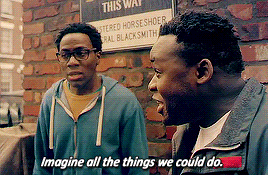
1 note
·
View note
Note
About your post on transfem visibility and transmasc invisibility-
Each side also ends up getting impacted by the other. Transmascs end up being affected by the Florida sports thing, and transfems end up being affected by the “protect our girls from putting testosterone in their bodies!!1!1!” thing (I think that one is in multiple states but I don’t remember which).
It’s also interesting how transmisogyny and misogyny against trans men end up, like... building off each other. Trans women are unfairly shoved into the role of predators, and trans men are shoved into the role of “maidens” in distress. By making transfems seen evil and making transmascs seem helpless, cis people binarise us and try (and sometimes succeed) to turn us against each other.
Overall it’s a shifty situations. Hyper-visibility is not a privilege, and neither is hypo-visibility.
i definitely agree with you! we're all impacted by each other and that's why it's important to remember in all this silly discourse-we're all trans and we're all on the same side.
and i totally agree with this: "By making transfems seen evil and making transmascs seem helpless, cis people binarise us and try (and sometimes succeed) to turn us against each other." transfeminine people are portrayed as predators and transmascs as maidens that need constant protection. it's completely false, but they do sometimes succeed in enforcing a competition of who has it worse narrative.
and yes, 100%-hypervisibility and hypovisibility are both not privilege and we've got to work on getting a healthy amount of attention on both of us, as well as unaligned/other trans people who don't identify with transfem/transmasc.
31 notes
·
View notes
Text
How can trans lives be seen and recognized as deserving of protection with the ability to live fully but without subjection to violent state intervention processes? How do we conceive of different modes of recognition and collectivity without falling into the traps of the visual, of bio- and necropolitical systems of valuation and economic extraction? What role should visibility play in the future of a critical queer and trans politics? A critical queer and trans politics can help us formulate modes of resistance and alternative collectivities beyond the racialized, classed, and gendered politics of visibility through what Tourmaline calls “nobodiness.” While a somebody is an individual who is not only recognized but given value by the market, the state, and mainstream society, a nobody is neglected, ignored, or actively exploited for value and targeted for disposal by those same entities. Nobodiness is therefore a strategic use of one’s marginalization to subvert the logics and institutions of heteronormative white supremacist capitalist patriarchy.
As Tourmaline explains in relation to her own experience with the commodification and exploitation of her recently acquired fame as an activist and filmmaker, “some of us somebodies need to remember the joy and the power of that less visible place that is actually so deeply visible to those in it and so violently hyper-visible to those that seek to destroy it.” The power and possibility of nobodiness then lies in its paradoxically invisible/hypervisible status. Even as nobodies are always subject to violent forms of surveillance, criminalization, and elimination, by engaging in everyday, local, and collective forms of care, organization, resistance, and action nobodies not only imagine, but “model . . . the worlds we want to actually live in.” In other words,
We all know the damage that it can be to be called nobody and yet there is power in that word and in that world of no-bodies. It’s a power Denise Ferreira da Silva cites when she asks ‘Do we want to be somebody under the state or nobody against it?’ . . . do we want to be visible subjects of . . . inhospitable institutions earning good credit by doing actions it deems of consequence and important or do we want to go undercover, be fugitives to the institution and its morals, unruly to its attempts at incorporation and assimilation. Maybe, and this is one of the hardest lessons I’ve learned, sometimes we want or need to do both.
Thus, nobodiness does not equate to invisibility, but rather, is a tactical navigation and subversion of the constraints of visibility and the dominant institutions that exploit those constraints for profit and power.
Mia Fischer, “CODA: The Perils of Transgender Visibility” in Terrorizing Gender: Transgender Visibility and the Surveillance Practices of the U.S. Security State.
[emphasis added]
#mine#readings#tourmaline#trans#surveillance#visibility#terrorizing gender#the state#di#state violence
227 notes
·
View notes
Text
okay so, since this is an actually polite and good-faith reply (surprisingly enough, considering this is the internet), i shall address it
The thing about this is that it assumes trans men are seen as baseline cis women. I've seen other trans women say "being treated as women is our best case scenario," but that just isn't how it works. Murder, rape, and suicide rates for trans men are catastrophically higher than for cis women. They are greatly reviled.
here i'll admit that i actually did not know of those statistics, besides suicide rates which are elevated for all trans people (although a headmate claims it did know, would've been nice if it told me earlier); would be interesting to compare to those of transfems but i'm too tired to do so, and as such will not comment on that
While trans women deal with hyper-visibility, trans men deal with invisibility
this i do agree on, however i do somewhat disagree on them being equally bad; if you're invisible, you won't gain any rights, but will also likely dodge losing any; in this case i'd argue transmascs are in part targeted because trans women are hypervisible and drawing fire from bigots, even
that's not to say they aren't both bad, just, not equally so, if you ask me; i'd much rather be invisible than hypervisible on a systemic level
people perceived as women are advantaged because they're seen as innocent and incapable of harm
that i do not think, and if i gave the impression i do, that was a bad wording on my part; the usual case in examples such as court cases is that cis women aren't seen as aggressors by default, but are also not listened to
what i was actually referring to was how transfems meanwhile don't get that, but also don't get the male priviledge of speaking over women; what we get is a combination of not being listened to, and being seen as an aggressor by default; we lack that assumed neutrality all others tend to get
arguably my perception is limited, as is everyone's, but in such situations from what i've seen transmascs get the same treatment as cis women, of assumed neutrality but also no voice over cis men
This conclusion even takes a ton of people to talking non-stop about how easy it supposedly is for a "TME" trans person to throw false rape allegations at trans women, which apparently happens a dozen times a day
this doens't happen literally a dozen times a day, and some do overblow the issue, however i have seen far too many examples of this personally across social medias to say it isn't the case, as much as i'd like to
transfems are indeed trivially easy to throw rape allegations at, because systemically, as i mentioned earlier, transfems are seen by default as oppressors; it's down to the targeted transfem to prove innocence (which still doesn't erase the damage done) rather than to the accuser to prove guilt, a reversal of how justice systems across the world work
transmascs i have not seen face this, especially with the same concerning frequency
This is literally what TERFs say about trans men
that is my point; it is not what i believe, but rather what society believes (or at least claims to)
AFAB people who masculinise themselves are indeed hated, however from my perspective that is usually to the cis mind a destruction of "holy" femininity, rather than an insidous, perverted attack towards innocents like it is with feminising oneself; a masculine woman is seen as ugly and undesireable by society, a feminine man is seen as a rapist
it is not priviledge, it is just slightly less aggressive oppression; hell, it's seen even from childhood, a boyish girl is seen as having a cute rebellious phase and only becomes a problem if that continues to adulthood, whereas a girlish boy is seen as something taboo and weird right from the get go
Like, okay, but isn't it weird to come into the transandrophobia tag
that one's me forgetting how people usually use tags on tumblr; i'm used to tagging being essentially "hey this is relevant to this topic in whatever way"; on tumblr it's a bit unusual in that a tag is more distinctly a space in itself
The implicit comparison here is unavoidably that trans men are to trans women what White people are to Black people. That's the degree to which trans men are having their oppression erased
think about how that's where your mind went to in the first place, rather than using two groups that are oppressed by maybe not at the same level
that's bad wording on my part; i tend to use racism as an example, because i know a large portion of my audience tends to be white, and racism usually gets through to white people by far the best in my experience when trying to explain oppression using a variety of means; and i tunnel visioned on optimising effectivity over accuracy
here it does in hindsight downplay the oppression transmascs face though, which i never intended to deny, but did so unintentionally
a lot of trans men are enthusiastic about buying into this because it gives gender euphoria to imagine that they have power over women, which they imagine they could use at least if they wanted to
many also do have power over trans women, whether they have power over cis women though is questionable at best
i have however witnessed that power fantasy several times, wherein a transmasc buys a little too hard into being a man, and forgets about feminism and equal rights entirely
--
anyhow, i'm glad someone is willing to discuss this topic in good faith, feel free to ask if you want me to clarify on something
with the whole TME/TMA debate, i see a lot of transmasc people complaining about that whole thing and talking about "transandrophobia"
so, i would like to clarify on that to everyone who might be reading this
transmascs do in fact experience transphobia, nobody is denying that, despite being TME; hell, transmascs can also face misogyny
what transmascs do not experience is transmisogyny; which is a highly specific intersection of patriarchal standards exclusive to transfems
--
the bigotry faced by transmascs tends to boil down to just seeing them as "confused women" or similar, essentially, as their AGAB rather than actual gender
which is, obviously, shitty, i don't think i need to even mention that but this is the pissing on the poor site so i do need to clarify that i think transphobia is in fact bad
--
now, what is with this "transmisogyny" thing then?
well, you see, transfem-targeting bigotry is, despite what bigots claim, not just seeing transfems as men by our AGAB
transfems are societally seen essentially as a third category, not woman enough to be women, but not benefiting from the priviledges men have in patriarchal society either
that will likely raise some questions in TME people, but ask yourself, when have you actually seen a transfem have the "male priviledge" you think we have?
--
that is the primary difference; we all face transphobia, but what that means in practice is very different
in part it likely stems from the fact that under patriarchy, transmasculinity is moving from a position of less priviledge to one of higher priviledge; it's seen as a misguided attempt at gaining priviledge and the safety that comes with it
whereas transfemininity is deeply confounding to the bigoted cis, because it is a move from a position of power and priviledge to one of.. not that; so there must be something wrong or some malicious ulterior motive behind that
--
that is why transandrophobia makes no sense; transmascs are oppressed pretty much solely on the basis of transphobia itself, there is no transmisogyny equivalent to transmascs
and to the transmascs reading this who might still be disagreeing: there is no oppression olympics, you do not need an equivalent for your struggles to also be valid
just like white trans people being at a position of power compared to black trans people does not invalidate our struggles, even if we acknowledge that we are in that position of power
if anything you should be using that position of power to make a difference rather than complaining about how the TMAs were mean; just like we as white people should be using our position of power to try and make the world a less racist place
the only reasons to not do so at least on a small scale is if you actually want to remain above others, in which case you can fuck off and die
hopefully none of you reading this fall under that category
67 notes
·
View notes
Text
1960s Sue Storm: A Recuperative, Feminist Reading
I’m not going to pretend that comics in the 1960s weren’t sexist by today’s standards. Of course they were. All popular media from that time was. Second Wave Feminism, at the time Sue first appeared in November of 1961, was still in its infancy and hadn’t yet made its way into popular consciousness (Betty Friedan’s groundbreaking feminist tract, The Feminine Mystique, wouldn’t be published until 1963). Pointing out all of the ways in which Lee/Kirby’s run on the Fantastic Four is sexist is not much of a challenge and not very interesting — what I’m going to do by reading 1960s Sue against the grain is something far more nuanced that I hope will restore some of the agency that fandom interpretations have stripped away from her. I am striving for a recuperative reading of 1960s Sue Storm, one that pushes back against the fairly common and pernicious notion that she is or ever has been “just” a meek and mild housewife, because she never has been that, and I think that highlighting the degree of agency, strength, and courage she had even in the 1960s will help emphasize that. I don’t find the complete and total erasure of the level of agency Sue did, in fact, possess in the 1960s to be particularly nuanced or feminist because it ignores how transgressive she would have seemed at the time. So I am going to point to moments during Lee/Kirby’s run where Sue exhibited agency, strength, and power that were feminist for the period in which they were written, while simultaneously acknowledging that the narrative frequently undercuts and underserves her. I am not at all pretending that any of this was intentional on Jack Kirby or Stan Lee’s part -- I don’t and can’t know that, and frankly, I don’t think it matters in this context.
To begin with, Sue’s invisibility can be read as a critique of sexism, since it grants her both the ability to escape the male gaze and to weaponize her societal invisibility as a woman. I’m sure we’ve all heard of Ellison’s 1952 novel Invisible Man, which comments on both the hyper- and invisibility of black men. The manner in which Sue’s powers function is not unconnected to Ellison’s nameless Invisible Man. Sue’s physical beauty always exposed her to a great deal of unwanted male attention, but that surely escalated after she became famous as a member of the FF, thus becoming hypervisible to a degree she hadn’t been before. We see this in Fantastic Four v1 #10, when a strange man on the street recognizes Sue and interprets her fame as permission to harass her. Her invisibility allows her to dodge him and his gaze while she vehemently condemns his misogynistic behavior.

Note that it’s specifically framed as Sue resisting, by turning invisible, his reductive view of her as a beautiful object that exists for his pleasure and not much else. “Mmm -- you shouldn’t ever turn invisible, doll!” he tells her. “How’s about a smile for one of your fans??” This is immediately followed by Sue directly defying him by both refusing to smile and turning invisible, thus removing herself from his sexualizing male gaze. Sue’s invisibility is in this way feminist and transgressive -- if women within the highly patriarchal society of the U.S. in the 1960s were given little choice but to exist as sexual objects on display for the titillation of the men around them, their subjectivity and humanity stripped from them, Sue’s invisibility gave her the power to defy that narrow categorization and control when she is seen and by whom. She claimed for herself the power to remove herself from the patriarchal male gaze that sexualized and dehumanized her whenever she wished.
Cut for length.
Her invisibility also allows her to transgressively wield her enemies’ sexist tendency to overlook and underestimate her against them (i.e., treat her as though she is insignificant and thus invisible). She is only successful in defeating male villains when she turns invisible because none of them ever think to wonder what happened to the FF’s female member. They are too busy focusing on the men, who they mistakenly view as more powerful and thus more of a threat than a mere woman. In Fantastic Four #5, for instance, Victor Von Doom demands that Sue surrender herself as a hostage so that he can coerce the male members of the team into doing as he demands. Victor’s plan hinges around Sue being a helpless damsel in distress, but Sue turns the tables on Victor by making the decision to go with Victor part of HER plan to gather information and draw him out into the open. Notice that Reed defers to Sue’s leadership here:

And her plan ultimately works. She defeats Victor and rescues herself and her teammates, all of whom would have been murdered by Victor if not for her. She is able to do so only because Victor does not deem her much of a threat and therefore overlooks her. She might as well have been invisible, as far as he was concerned—and she uses that fact to defeat him.
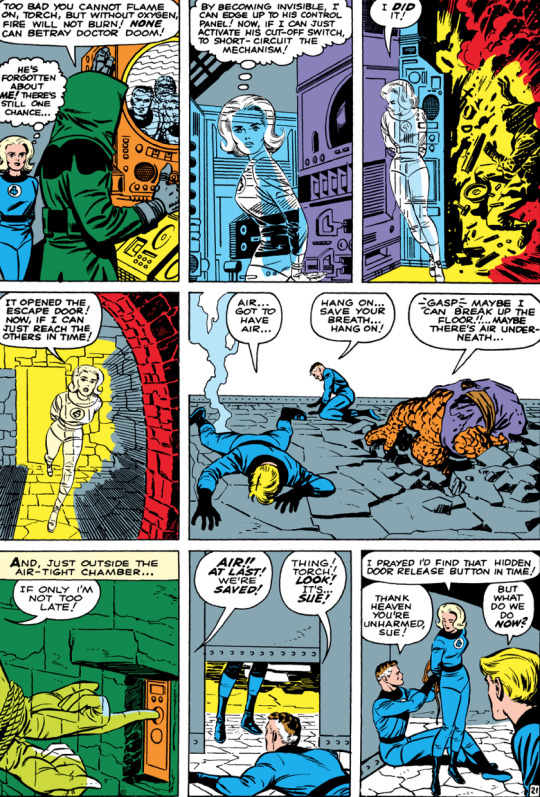
This overlooking of Sue by male antagonists happens repeatedly -- for instance in Fantastic Four v1 #95, when the Monocle also forgets about Sue completely:
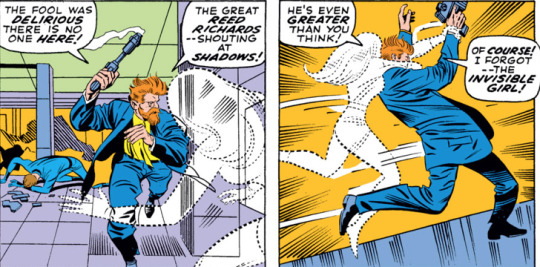
Fantastic Four #5 is not the only time in the 1960s that Reed defers to Sue and her leadership, might I add -- in Fantastic Four v1 #20, Sue proposes one that centers around her taking the Molecule Man’s wand away, and Reed agrees to play bait for her:
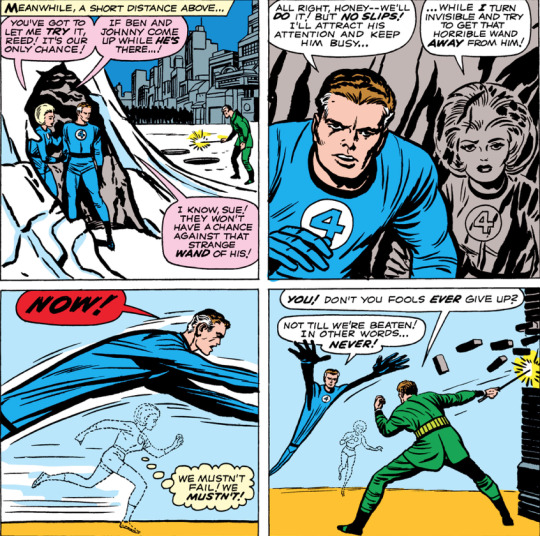
They are working as a team here, as equal partners, which is what Lee at least presented Sue as, even if his ability to imagine what equality for a woman looked like was severely limited. Within the comics themselves, Sue herself has always insisted on equality both as a team member and as Reed’s lover and, later on, wife. In 1964′s Fantastic Four Annual #2, Reed, concerned with his girlfriend’s safety, decides that Doom is far too dangerous an enemy for Sue to go up against, but Sue insists on being treated like a full member of the team, as she always has been—and even threatens to break up with Reed if dating him means that she’ll be left behind on dangerous missions.
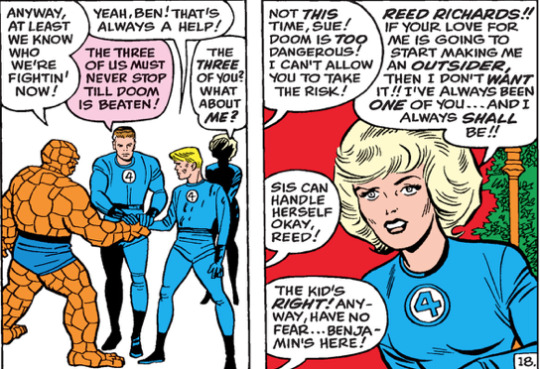
And she actually follows through on that threat nearly a decade later in 1973′s Fantastic Four v1 #130, which takes place after they’re married and have a son. The Frightful Four attack and Sue participates in the battle, but when Reed orders her to get their infant son to safety and Sue doesn’t listen, they get into an argument. Reed is livid that Sue (recklessly, he believes) prioritized remaining in the fight over their baby’s life, and Sue is equally furious that Reed is treating her as though Franklin’s mother is all she is rather than as an equal teammate. She then leaves him for the first of two times (the other being during Civil War I).
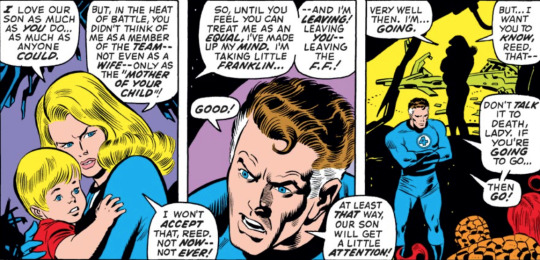
When they reunite, Sue is adamant that she be treated as an equal by all of them. Reed struggles at first to stop being so overprotective of Sue, but he does his best to comply because she has been very clear that if he does not, he will lose her permanently. By the time Marvel Two-In-One v1 #67 was published in 1980, he is able to tell Ben that he’s made his peace with the fact that Sue has just as much right to put herself in harm’s way as he does:
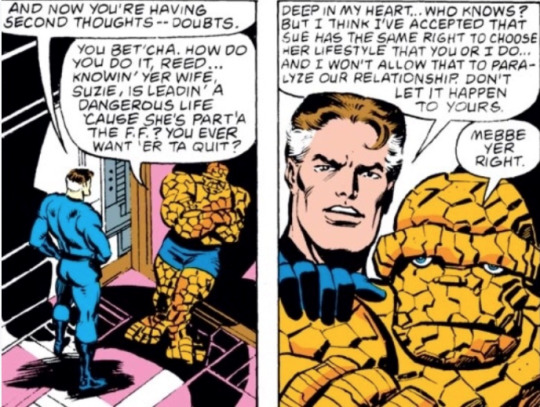
It’s worth noting also that in every version of the origin story, Sue’s decision to become a superhero—i.e., a warrior, on active, front-line duty—is never questioned by Reed, Ben, or Johnny (contrast that with Wonder Woman two decades or so earlier, who was initially relegated to being the Justice Society’s secretary). As a matter of fact, while Reed mentions in Fantastic Four v1 #22, the issue where Sue develops the ability to create forcefields, that Sue has been doubting the value of her powers and her usefulness to the team, he emphasizes that, to the contrary, she is “about to become the star member.” So not only has Sue always been a member of the FF, 22 issues after her first appearance she was already being presented as its most powerful member thanks to her forcefields. Needless to say, the fact that Sue was not only a member of the FF but also explicitly its most powerful member was fairly groundbreaking for the 1960s. I struggle to think of another team from that time period that could say that its female member(s) were the most powerful or that their superiority was openly acknowledged by every male member of the team.
Sue was also an active part of the team from the beginning and went everywhere her team members did—to the moon, other planets, other dimensions, Monster Island, the heart of Latveria, up against the Hulk, Skrulls, the Molecule Man, etc.—no matter how dangerous. She occasionally even spearheaded their attacks on villains and even made her own battle plans. In Fantastic Four v1 #3, which was only the FF’s third appearance, Sue goes after the Miracle Man by herself because she believes that she alone will be more effective than an entire army battalion:

Sue takes on a leadership role in these early issues far more often than anyone nowadays ever acknowledges. In Fantastic Four v1 #23, when the FF start to bicker and question why Reed gets to be the one in charge, Ben, Sue, and Johnny all vote for who they think should lead the team—and Sue votes for herself. She isn’t content to simply be a part of the team. It is 1964, and she already wants to lead the FF and thinks it’s time for a woman to do so.

And she one day would. By the 1980s, she was already the FF’s second-in-command, in charge when Reed wasn’t there, and she briefly took over leadership of the team when Reed was abducted and put on trial for saving Galactus’ life. In the 1990s, when Reed was twice presumed dead, Sue became the team leader both times and Ben and Johnny answered to her. By the 2000s and 2010s, the balance of power in Reed and Sue’s relationship has shifted almost entirely in Sue’s favor, to the point that Reed himself admits that Sue is the real leader of the team:
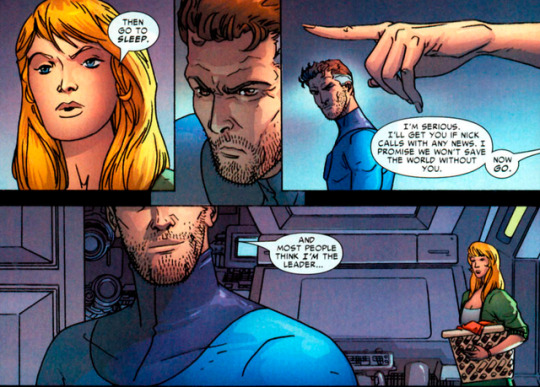
But it’s not as though these panels have no precedent, even all the way back in 1970′s Fantastic Four v1 #98:

Reed and Sue’s relationship has simply never been what fandom makes it out to be -- one that is profoundly unequal, where Sue gets no say at all in anything. It’s always been more of a back-and-forth, more of a partnership. Sue has always had the power to order Reed around (in certain contexts, at least) and Reed has always listened to Sue and her advice. Her power and influence has indisputably increased over the years, but it’s important to note that it was never wholly absent.
I could also point out that Sue has a perfect right to lead the team she was largely responsible for creating. Her role in the formation of the FF tends to be vastly underestimated. Sue was instrumental in orchestrating the FF’s theft of the rocket ship that Reed designed, which has been canon since Fantastic Four v1 #1. Without Sue passionately persuading Ben to fly the rocket (while Reed stood silently by), the flight never would have happened:
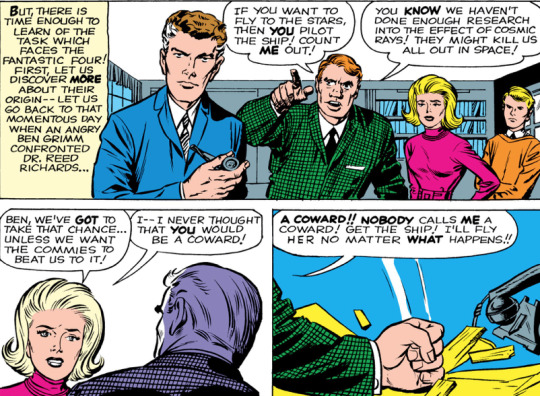
Neither was she solely motivated by her love and loyalty to Reed—in this, the original version you see above, her sense of patriotism had just as much to do with why she decided to accompany Reed on the rocket flight. Later writers have even portrayed Sue as being motivated by a love for adventure that rivals Reed’s and, more importantly, as being responsible for pushing Reed to go through with his plan -- Reed says point-blank that he was “content doing pure research” until Sue “pulled me out of the lab and into your amorphous idea of ‘field work.’” Despite the fact that it’s largely (wrongly) understood as Reed’s plan and Reed’s decision, I think that canon actually points to the theft of the rocket ship as being something that Reed and Sue decided and implemented together—or, arguably, even as more Sue’s than it was Reed’s. He floated the idea. She made it happen. Ben decided to pilot the rocket because Sue talked him into it. Johnny tagged along because of his love for Sue. The FF would never have come into being if not for Sue.
While 1960s Reed has become something of the poster boy for 1960s sexism in fandom, I think that attitude is unfair, inaccurate, and detrimental to fandom perceptions of Sue. At the time, Reed certainly wouldn’t have been read that way -- he gave his wife a great deal of freedom and autonomy for the time period, readily acknowledged that she was more powerful than he was, followed her leadership at times, and even personally trained Sue in hand-to-hand combat. Sue, it’s worth pointing out, has always defied and exceeded conventional femininity’s bounds, and Reed has never had an issue with that -- to the contrary, he’s actively supported and encouraged her. In Fantastic Four v1 #17, for instance, Victor abducts Alicia Masters, and Sue is the one who finds her first. When Victor enters the room, Sue is so confident that she can defeat him singlehandedly in hand-to-hand combat that she calls him her prisoner and says that she’s been looking forward to proving what she can do on her own:
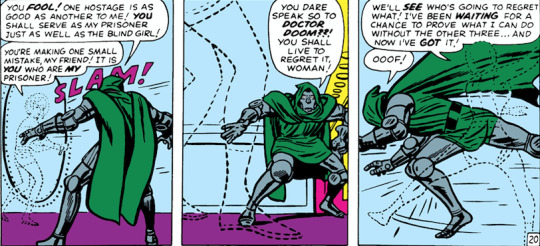
And then she does, and Victor is forced to resort to pointing a gun at her to defeat her (this was before her forcefields):
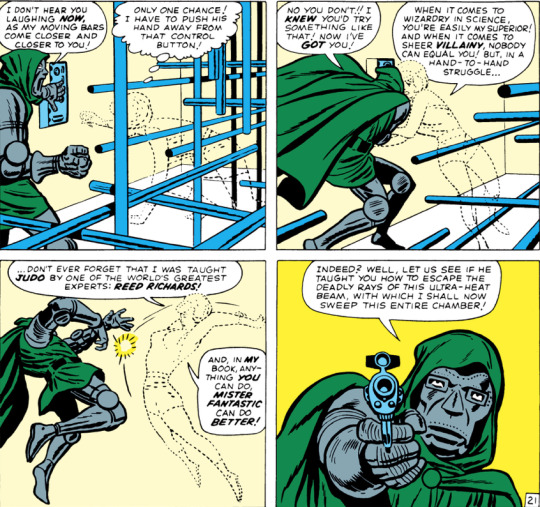
She is so confident that she can beat him in hand-to-hand because she has been trained to fight by Reed, who even in the 1960s thought his girlfriend should know how to fight and didn’t think it too unladylike.
Furthermore, I would argue that Sue chose to marry Reed rather than Namor precisely because Reed was significantly more respectful of her agency, consent, and right to self-determination and bodily autonomy than Namor ever was (...not that that’s a high bar). In Fantastic Four v1 #11, Reed, while discussing his and Sue’s lengthy romance (at the time, they were childhood sweethearts who had known each other their whole lives), brings up the fact that Sue has not decisively chosen between him and Namor. Sue tells him that she doesn’t know how she feels, and Reed very respectfully says that he understands how she feels and promises he won’t mention it again until she does, a promise he, crucially, keeps.
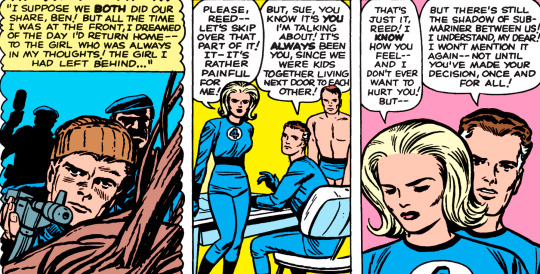
Fantastic Four v1 #27, however, is the pivotal issue where Sue definitively chooses Reed over Namor, and she does so because Namor proves to her that he has no respect for her or her wishes while Reed proves that he does. The issue begins with Namor deciding unilaterally that he has waited long enough for Sue to make up her mind -- he wants the decision made on his terms, at his pace, rather than on Sue’s. So he announces to his people that he’s going to marry Sue now (without having bothered to ask her what she wants, if she’s ready, etc.) and then goes to the Baxter Building and beats up Sue’s family. When she arrives, she is horrified at what he’s done and frantically tries to see if her 17yo baby brother is all right, but Namor knocks her out and abducts her. She wakes up to find herself trapped in a glass bowl and screams to be let out, but Namor ignores her pleas:
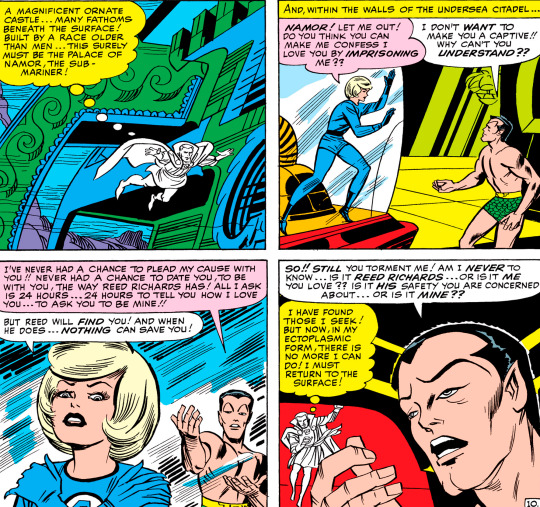
This is a clear violation of Sue’s right to bodily autonomy and self-determination. She does not want to be in that glass bowl, but Namor does not listen to her or care about her consent. Namor is attempting to coerce Sue into behaving as he wishes -- i.e., imposing his will on her -- rather than allowing her to make up her own mind as Reed did. And he has the colossal gall to literally blame the victim by implying that she made him abduct and imprison her because of her indecisiveness. Reed, let me point out, never felt the need to do the same, despite being in a worse situation, given that he and Sue had known each other their whole lives, been dating for years, and were virtually engaged before Namor showed up. Despite all that, when Namor taunts Reed by asking what he would do if Sue chose Namor rather than him, Reed replies that Sue will, of course, decide for herself -- but on her time and her terms, not on Namor’s or Reed’s. Sue, unsurprisingly, announces at the end of this issue that she loves Reed and not Namor, and that was the end of the love triangle for the next decade.
Reed continues to be uncertain about her feelings, however. He doesn’t propose until Fantastic Four v1 #35, and he does so only after Sue herself says that she has been waiting for him to propose and echoes back the phrase (“It’s always been you!”) that Reed used to declare his love for her in Fantastic Four v1 #11. He waited until she signaled to him that she was ready, on her own terms and at her own pace.

I keep reading people wondering why Sue would have chosen a nerd like Reed over a hunk like Namor, and this is why. Reed proved to Sue that he respected her right to decide who she loves on her time and her terms, and Namor proved definitively that he did not.
And even after Sue marries Reed and has a baby, she does not quit the team or remain at home. While she does take a brief leave of absence during her pregnancy, she returns to active duty in a rather spectacular way. Reed, Ben, Johnny, and Crystal are all in Latveria, powerless, and on the verge of being blown up by Doom’s bombs, along with the village they are in. The bombs go off...and everyone is mysteriously fine. No one can understand why they’re still alive until Sue materializes, and they realize that she saved everyone with her forcefields.
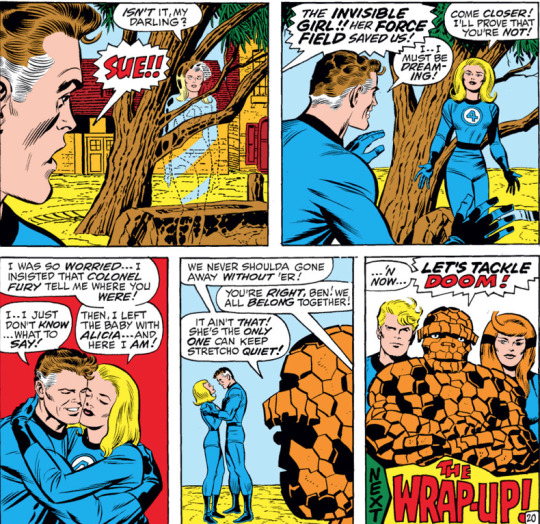
Reed is overjoyed that she’s there -- despite the extreme danger -- and not at all upset by the fact that she has returned to active duty. Let me also point out that there was never any question of Sue leaving the team after she married Reed or even after she had a baby, and this at a time when it was expected and commonplace for women to quit their jobs and become housewives after marriage. Reed, Ben, Johnny -- they all simply assumed Sue would continue on the team as she always had.
So of course comics in the 1960s were sexist, of course Sue was sometimes frustratingly passive and silent by today’s standards, but that doesn’t erase or diminish all of the times when she was not. Sue has been fighting tooth and nail to assert herself as an equal for decades, and personally, I think that her tenacity, determination, and courage even when belittled and underestimated by the men around her make her just as much of a hero as her superpowers, if not more so, and I am, frankly, tired of fandom's constant belittlement of Sue.
#fantastic four#susan storm#reed richards#prime marvel universe#comics#meta#mod: lamujerarana#long post
165 notes
·
View notes
Quote
To be fat is to be both hyper-visible and invisible.
https://www.forbes.com/sites/virgietovar/2018/12/05/use-hypervisibility-to-your-advantage-says-this-xlbosslady/#3aa973481e71
1 note
·
View note
Text
continuing on the analogy before i do think that the visible vs invisible disability example falls flat because the extreme level of abuse control and loss of human rights, impairment of personal goals and daily stress a hyper visible "lower functioning" autistic kid goes through vs a more invisible high functioning kids struggles is so night and day that doesn't line up super well in scale to the cis vs trans thing for women in the west where girlhood hypervisibility and invisibility has consequences but the consequences remain like AROUND the same ballpark all other demographics being the same and in which trans women have the more severe outcomes and cis girls have clear privilege overall
that extreme hyper visibility oppression perhaps applies better to like cis women in countries where it's like fully legal to steal a child's human rights if you assign them female at birth. where clitoral genital mutilation child brides is legal and woman can't own property that sort of thing is important because in that case yea cis girlhood is just not a privilege over trans girlhood and thats not even saying trans girlhood is a clear privilege there. only that yea it would be dismissive of the plight to talk cis privilege i think anywhere when hyper visible cis girls and women aren't allowed live as free citizens. that does make sense and can be talked about while still a trans inclusive feminist. like all oppression is situational to some degree and material reality comes first. generally in these life and death, freedom or slavery extremes ANYONE who can be closeted in their marginalization is protected and safer which is a privilege. but that is just apples and oranges to cis girlhood in america which is altogether clearly a privilege over trans girlhood.
0 notes
Text
THANK YOU
i am getting so tired of people saying erasure/invisibility is always painful and horrible and never, like...
...why that angry phobe punched the fruit/bull and didn't punch you
like, is that "a privilege?" no, no it isn't, and we shouldn't use that word for it
but... it's so weird as a bi person seeing people talking about how horrible "invisibility" is as if i don't get treated differently when i am with a boy by the kind of people who want me to be only with those
both invisibility and hypervisibility are bad, for different reasons but for reasons that are interrelated, as none of us would be either inv or hyper if we weren't seen as a threat
Exhausted sigh Erased/invisible queer identities have an easier time in situations where invisibility is a benefit and a harder time in situations where recognition is a benefit. The opposite is true for recognised identities. Both situations occur frequently. This isn't hard.
There are obviously cultural and historical contexts where one might be more common but neither queer utopias where everyone needs only recognition or perfect panopticon dictatorships where queer people are prevented ever from interacting exist or ever have existed, so both are always necessary.
Discourse about whether bi/pan or nonbinary people have it better or worse is meaningless navel gazing about a reality that does not exist at best and harmful and unhelpful community dividing bigotry at worst.
5K notes
·
View notes
Text
for the longest time it struck me as odd, the way that the LGBT community at large upholds “visibility” as some kind of goal or ideal to be fought for. it wasn’t until recent years that i actually stopped and thought about it enough to realize why reference to and usage of “visibility” in this way bothers me so much.
as someone who has always been and will always be hypervisible because of their race, it baffles me when people advocate for visibility as if visibility is what we all want; as if visibility is even a means to getting what we all want.
this upholding of visibility as something important for all of us to fight for seems grossly negligent of the fact that some of us are already more visible than others and that that very visibility is part of what has gotten some of us bullied, turned away from certain circles or spaces, refused jobs, pulled over unjustly by cops, assumed to be something we’re not, assaulted for using a bathroom, asked how many articles of clothing ‘of a particular gender’ we’re wearing, cornered in alleyways and worse. “visibility” is not just an LGBT issue and it is not just a matter of needing more of it-- some of us are already visible as something the second we step out of our home and that visibility, be it in regards to sexuality, gender or something else entirely, is still wholly relevant to matters of LGBT advocacy.
on one hand, i understand the importance of days like Trans Day of Visibility, Bi Visibility Day; of organizations and people dedicated to visibility and for the fight for LGBT visibility in general. to an extent. but i often find that what people use “visibility” to mean would be better said if they replaced that “visibility” with “awareness” or “representation”...? then again, i’m sure that there are also people who really are fighting to “visibly” be their orientation and / or gender-- whatever that may mean to them personally-- because the flipside of being hypervisible is not being visible at all, ie. invisible, and i know that both can be equally horrible because, believe it or not, the very thing that makes me hypervisible to the world outside of my apartment also renders me invisible in many LGBTQIA spaces. it’s possible to be both hypervisible and invisible at the same time.
however, even acknowledging the fact that advocacy for visibility is often aimed at combating what many feel to be invisibility, it still irritates me that we have entire days and weeks devoted to visibility with seemingly little-to-no acknowledgement of how much of a double-edged sword visibility actually is and how that visibility plays out in different ways for different people.
i mean, every year the irony that is the Trans Day of Visibility’s celebratory focus on trans people through increased visibility contrasted against the Trans Day of Remembrance’s mourning of the loss of those who were often the most [hyper]visible and subsequently most vulnerable among us... yeah, that irony isn’t lost on me at all.
so yeah, uncritical advocacy for increased visibility will always make me weary. indiscriminate usage of “visibility” as being synonymous with “awareness” and / or “representation” will always be cause for pause.
#bi week#asexual#nonbinary#bi#queer#visibility#invisibility#awareness#representation#terminology#advocacy#intracommunity issues#lgbt community#bi community#trans community#ace community#intersectionality#QPOC#random thoughts#this has been a Vesper original#queued
205 notes
·
View notes
Text
i think some people missed the point completely. No, this post intent's wasn't to put transmascs and nonbinaries against trasfems. I absolutely believe we both have struggles. About the estrogen part, it's easier in a way because you can just pay for it and get it, like...not with a doc's recommendation. It's not a good thing to do but at least some do due really high dysphoria while for people wgo want testosterone, even if we try to buy it normally we can't because of stupid CIS men who used it irregularly to build muscled.
Imma repeat this once again: We all suffer.
Transfems suffer from hypervisibility
Transmascs suffer from hyper invisibility
Nonbinaries suffer forom much more hyper invisibility than transmascs, and when represented, most of the time they are creatures or AFAB/CAFAB without personality.
I get it, most representation media tries to make is shitty but at least there is some representation??? Better than nothing! And I'm not saying we shouldn't complain at shitty representation, but look into a general area of it.
Also another thing I completely forgot to point out, is how intersexual people, too, suffer from hyperinvisibility. Like much more than transmascs and nonbinaries, they're so erased i accidentally forgot to mention them. They're not necessarily in the trans community (?)(correct me if I'm wrong I am open to constructive criticism) but they also deserve to be mentioned here.
The queer community as a whole is a minority, and my point is: let's not make the less common groups be a excluded minority inside another minority. Diversity is important and representation too!
I'm tired of trans "representation".
every time there is a show, trans rep = trans woman.
Never trans man or transmasc.
Even rarer non-binary, who are fem-presenting most of the time. media presents afab non binary people more than amab non binary people, because they think that being NB is just being "Woman lite" (it's a running joke in the transphobe community)
Always trans fem who are pretty
Never middle transition fem Like...HELLO, "UGLY" TRANS PEOPLE EXIST OKAY? AND WE HAVE VARIOUS WAYS OF DRESSING! Yet everyone makes us be always the generic ones!
But the FEMS are everywhere
Not their fault (I think) but they get much more rep and resources and luck to transition than transmasc
Estrogen easy to get (they think cis women want preg)
Testosterone takes a huge annoying work (cis males fault for using it irregularly)
"Getting mtf hrt legally is 10 times easier than getting ftm hrt in a legal way. Even when getting it in a legit way is still harder. It's like they're trying so hard to keep women" - my friend
To a point many transmasc look "too afeminated" to even get a rep
Always tagged as "masculine woman"
Both transmascs and transfems suffer, but one suffers with the suffering more seen than the other
And then we get invalidated by those annoying transfems who say "we suffer more than you" (Yes i saw that one post)
We both suffer the same things, bitch. But at least you're lucky media likes you more than me.
im not saying "fuck you all" to the transfems im just saying "hey we ALSO matter! Not just you, we are even more erased than you!" PLEASE SEE US! WE EXIST! TRANSMASCS ALSO SUFFER! NONBINARIES WHO ARE MORE IN THE AGENDER OR MASC AREA OF THE SPECTRUM ALSO SUFFER!
#transgender#trans community#trans masc#nonbinary#transmasculine#trans male#ftm#mtf#trans feminine#trans femme#trans women#trans erasure#over saturated#am i overreacting?#im not overreacting.#transmasc erasure#lgbtq community#lgbt#lgbtqia#lgbtq#lgbtqiia+#lgbtqiapn+#im tired#i need representation#please look at me#please#I exist look at me#i exist#and i need to be seen#Mjk_k.txt
60 notes
·
View notes
Note
Hey, I just wanted to say that I really loved your post explaining the different aspects of marginalization. One thing that struck me though was when you mentioned that an aspect of invisibility is silencing tactics and preventing oppressed groups from developing language to describe their oppression. I think this is absolutely happening in Ace Discourse, but I wanted to know your thoughts on situations where maybe the invisible group is coopting a hypervisible group's language? (/1)
I’m not talking about the word “queer” because I think that that has a much more far reaching definition by now, but terms like “coming out” or the recent argument around using the chant “We’re here, we’re queer, get used to it” by aces. Do you feel that language of marginalization is universal enough to have such language shared across groups like that? For example if, such as your example, Asian groups started using terms created by black groups, to describe their marginalization? (/2)
Hey there anon! I waited a few minutes to make sure all your messages came in, so I hope this is your full question.
The answer is “it depends”. Some language of marginalization is universal, but some is not. “Racism”, “anti-X race” language, “X normativity”, ect are much more universal and is based around talking about roots of oppression itself. Specific language that quantifies a unique expression of a group’s oppression, for example “mammy” stereotype or “lotus flower” stereotype, are not shareable. Even if the root is an exoticification, othering, depersonalization, ect process, they are not the same stereotypes, nor do they have the same exact implications even if they have the same root.
Both of the phrases you talked about fall into different categories. “We’re here, we’re queer, get used to it” is a radical rallying cry. It’s purpose is political and aimed at LGBT+ liberation and meant to be focused on straight cis oppressors. It’s not appropriate to use for intracommunity brouhaha, no matter how satisfying it might be for people on either side to say it to someone else.(and this is mostly aimed at inclusionists, don’t do this please.)
On the other hand, “coming out” describes a general LGBT+ experience. It’s about “leaving the closet”, becoming visible when heterosexuality is the assumed default and assumed state of everyone. This isn’t an experience specifically tied one LGBT+ identity. The experience is about refusing invisibility. Some group members then become hypervisible as a result of claiming their identity, but others are then rendered invisible. That is, the forces of oppression then try to deny their existence. This is similar to being in the closet(a state of invisibility), only this time it’s directly coercive and enforced through violence. NBs are typically subjected to enforced invisibility when they attempt to come out.
The question then becomes, are aces/aros denying invisibility by stating their orientation, and are they then assaulted by being rendered either hyper or invisible?
I haven’t seen anyone in discourse claim ace/aro identities are “visible”, in fact even the most determined exclusionist say Ace/Aro problems are “mostly about visibility”. So, we know they are “unknown”. Do ace/aros when they assert their existence get subjected to violence meant to either render them silent, deny their existence, or ignore their presence? And I’d say the answer to that is yes. Not just in the discourse, in fact, rarely in the discourse on tumblr itself(though there is a growing concerning movement regarding this among discoursers that I’m going to address when it comes to conversations about radicalization of politics mmhm. Omg I keep promising more posts whhhyyyyy...) Generally, Ace/Aro are subjected to social violence/backlash intended to deny their existence, deny their reality, ignore their experiences, ect. That sort of behavior is subsets of “invisibility making”. That being the case, I think the usage of “coming out” is appropriate when talking about ace/aro labels. (when seen in the context that “coming out” describes a LGBT+ experience surrounding their manifestation of normativity and normativity enforcement.)
As a final note, I’d like to talk about the coopting of language as a consequence of enforced invisibility. A direct way to enforce invisibility is to remove, ridicule, suppress, ect the language of the oppressed.(and this is especially useful for enforcing internalized powerlessness on the group in question as well.) Language is power, and the denial of language removes the person’s ability to accurately describe, relate, and change the situation they find themselves in. This is the underlying insidious danger around Newspeak in 1984. To remove the ability to even think crimes, to render thoughtcrime(the idea of rebellion and the destruction of the oppressive system) impossible. Enforced invisibility around NB genders is meant to directly prop up the system of binarism over which a lot of patriarchal foundations rest. (Binarism, that there is only two genders, as opposed to being binary. They are very different things. Binarism is a tenant of radfem terfs for example) Enforced invisibility around ace/aro identities is likely used to reinforce heterosexism. You can not merely “opt out” of the system by “not experiencing” these things/desires. You MUST have these desires, so that these desires can be uncatalogued and you sorted properly. So that this proper sorting can be used to enforce other kinds of violence against you. This, btw, is ultimately why I think the system of heterosexism doesn’t like ace/aro IDs. You are not allowed to “opt out”.
A result of the denial of language though, is the group in question then trying to make their own. If this language and experiences aren’t allowed to be discussed/recognized/are actively fought against, you leave the groups with little choice but opt to use other language. The group will likely recognize that the language of the oppressor group doesn’t fit, it’s why they tried to make their own. They will then opt to use language from a different group, typically groups rendered hypervisible(as their language and culture is plastered with neon and put under a microscope.)
This isn’t something I support or think should be done, but it’s like my octopod friend says about the difference between primary and secondary aggressor in abusive situation(though they know more about this than I do, the comparison is apt.) “Mutual abuse” doesn’t exist. There is a primary and secondary aggressor. They might be hard to differentiate, but it exists. Once the primary aggressor and abuser stops, the secondary aggressor’s behavior stops. The secondary aggressor’s behavior is dependent on the violence of the primary aggressor, the primary aggressor enacts abuse for internal reasons.
In this way, the coopting of hypervisible groups language is a result of the primary aggression of enforced invisibility. If these groups were allowed to develop language of their own, they would stop using hypervisible groups language. Now, hypervisible groups aren’t the primary aggressors here, they aren’t the abusers(heterosexism is the abuser here), but as a result of the different way this abuse manifests, you see different behavior from each group. I’d also like to state that playing into enforced invisibility to counter productive. I see a lot of discourse going out of the way to ridicule aro/ace language or NB language. I see a lot of discourse around how “problematic” a term is, often for the implicit purpose of rendering a group silent. I even see discourse that directly contradicts the idea that the group in question exists and has specific experiences to relay that need language.
This is especially unfortunate coming from other LGBT+ people, because all of the nasty angry screaming they do about Aces/Aros “Stealing” LGBT+ language is only exacerbated by their refusal to allow specific ace/aro language, or their constant regular ridicule of that language(and this is truly mostly aimed at exclusionists. There is a lot of ridiculing of Aro relationships and their language/words for it. And there is a lot of language and posts aimed at claiming aceness isn’t real/doesn’t need to be an ID/isn’t a coherent experience. The latter of which as an enforced form of invisibility is what a lot of inclusionist discoursers have been referring to as “gaslighting”. I can pull up specific examples if need be, but generally claiming an experience doesn’t/isn’t happening, or doesn’t need specific words for it involves enforcing invisibility.). If you want Ace/Aros to stop using “LGBT” language, you have got to let them develop their own words. Without ridiculing it because you think it’s “dumb” or “what everyone experiences”. Without denying that these things happen to them or they are feeling this way. Without being threatened and claiming that every attempt at actualization is Xphobic(this only happens on tumblr, but I’d thought I’d mention it) using tedious, ignorant, illogical statements. Let them make their own language, and they’ll stop using yours.
3 notes
·
View notes